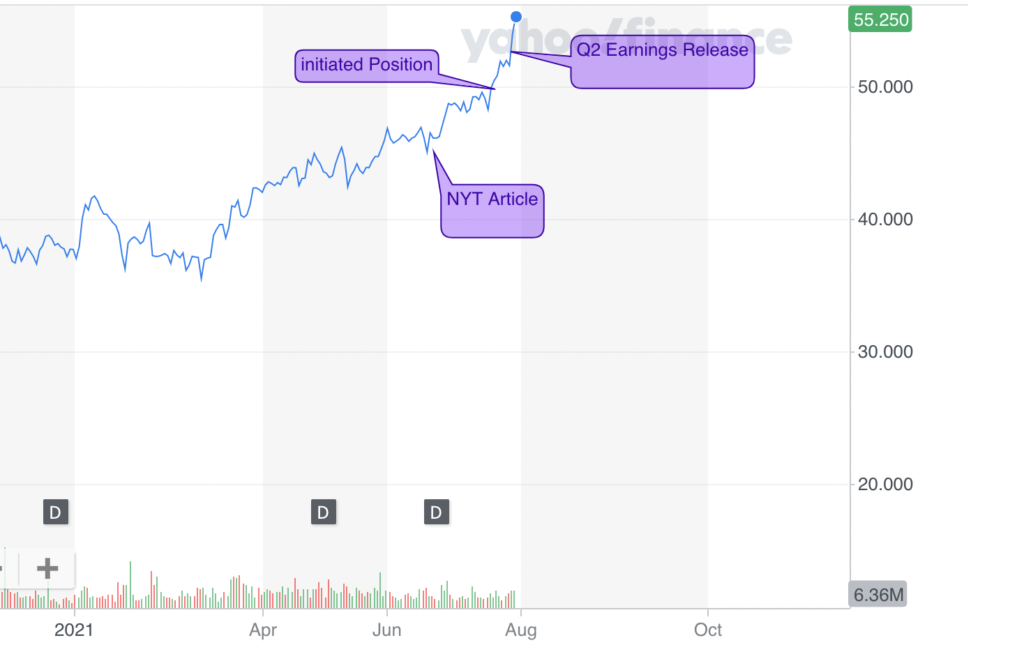Per my last post, I liquidated my position in Jinko Solar at around $60 a share, however had to realize a loss on the covered call I had sold, in order to do so. Following this liquidation I began buying shares of Carrier global at around $49.00 a share. However, since I no longer wanted Robinhood as my brokerage, but rather Wells Fargo, for reasons I shall delineate in a future article, I was forced to sell these shares at cost. Resettling the funds in my Wells Fargo account tied up my capital for approximately a week, during which time Carrier began trading at $51.50 a share, which represents my new cost basis. Hoping for a slight decline in price, I only purchased shares with ~80% of my portfolio allowing myself some flexibility to purchase shares should they decline slightly. Additionally, since I was unable to purchase option contracts on my new account, I could not leverage my belief in Carrier. Nonetheless, I believe my investment thesis in Carrier to be sound, and will delineate the reasons below.

I became interested in the prospect of HVAC (Heating, ventilation, and air conditioning) companies after reading an article in the New York Times. The article, titled, “Air-Conditioning Was Once Taboo in Seattle. Not Anymore”, made a compelling case for growth in the HVAC market. Further research yielded the largest HVAC companies, listed below by current market capitalization.
- Daikin Industries ~ 60 Billion market cap (41 Price/Earnings TTM)
- Carrier Global ~ 48.1 Billion market cap (21 Price/Earnings TTM)
- Ingersoll Rand Inc ~ 20.5 Billion market cap (63 Price/Earnings TTM)
Not only was Carrier previously known to me, it also represented the cheapest large HVAC company. In a brief aside, Carrier was founded by Willis Carrier, who invented Air Conditioning. Additionally, Willis Carrier is an alum of Cornell University, where I’ll be attending this Fall! Recognizing the brand cachet I already associated with Carrier, I decided that it warranted a serious look as an investment.
Carrier Global, in its current iteration as a corporation, became public in 2020 following a spin off from United Technologies. This split created three separate companies, Raytheon Technologies (a defense manufacturer), Otis Worldwide (Elevator Manufacturer), and Carrier Global. Carrier’s portfolio focuses on three business segments: HVAC, Refrigeration, and Fire & Security. These three segments accounted for 53%, 19%, and 28%, respectively of the company’s $17.5 billion net sales in 2020.
This being only my first article on Carrier, and my need to mine content, I’ll only begin with a rough analysis of the HVAC segment. The HVAC segment will grow by both virtue of climate change, and Carrier’s strong brand recognition. Furthermore, Carrier has strong relationships with builders in key markets. This stickiness will translate to more sales as building and physical infrastructure ramps up over the next few years. Although demand for commercial and light commercial units may be depressed for the next few years, it will be more than offset by growth in the residential space. Given the extraordinary appreciation of home values over the last year, ~17% nationally, supply will certainly be trying to catch up and this can already be seen with housing starts, in June, up 29% year-over-year.
Also, Carrier is deploying a digital offering called Abound, which I believe will tie more real-estate developers to the Carrier ecosystem. The premise of the offering is to capture data about the air quality in commercial real estate and allow end users, consumers, to determine how safe a given building is. This is currently being marketed with Covid-19 in mind, however, I believe that this could easily be re-positioned from a pollution perspective. Densely populated regions such as New York or Deli, suffer from poor air quality that has serious adverse health consequences. In places such as these I believe end users will be very interested in the quality of the air they breathe. With the Abound pilot going well, I believe this offering, sold as a saas (software as a service) product, will further build the Carrier ecosystem and offer much higher margins than other products.
The reasons listed above are only some of the strengths I believe Carrier possess, and I will continue to expound on my investment thesis in future articles. Even with the rapid appreciation in price over the last week, I still believe that Carrier is priced cheaply and represents a very fair investment in the current market environment.